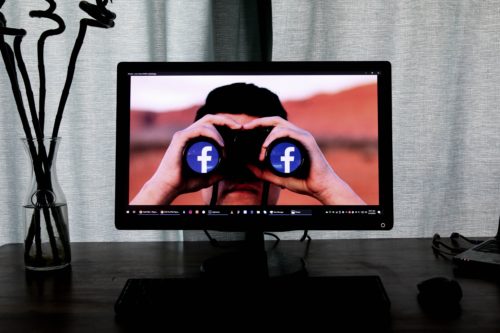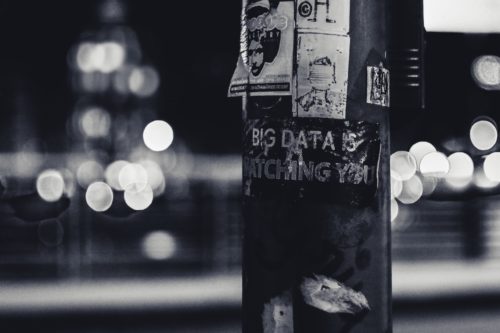24 Apr Have we internalised surveillance?
We’ve all been in situations where we mention a product to a friend and it suddenly shows up on our Facebook feed, or we search for something on Amazon and suddenly you find yourself looking at an ad for it on Instagram. We find ourselves living in an information era 1 where companies like Google know more about us than we know ourselves. If you think about it, we can no longer confine how and where technology is embedded into our lives to a particular time or place. It is a notion that we experience continuously in our daily lives.
We use technology to work, to relax, to entertain ourselves, to travel, to communicate, to cook, it is part of all that we do. This has been even more amplified with the pandemic, as we seek technology to serve as a bridge to tasks that were once the norm. Technology enables us to have meetings in a time when we cannot meet, it allows us to shop at a time where we cannot visit shops. Today, we are dependent on it more than ever.
What we maybe do not consider is that as technology gets engrained into our lives we are leaving a trail of digital breadcrumbs of our daily life activities. This includes our credit-card purchases, our emails, our Google searches, our travels, where we parked our car etc.
All this data we are leaving behind is being stored, collected and analysed by organisations, allowing for a constant electronic surveillance of our lives and for a subsequent violation of our privacy. The ubiquity of technology coupled with computer-mediated actions and transactions is enabling severe electronic surveillance 2 of our lives. Organisations are capitalising on the data collected and our borderline addiction to technology is an enabler to this surveillance capitalism.

Technology-enabled Surveillance
In the past years we have seen an exponential evolution in the reach, richness and functionality of IT that has allowed for the creation of advanced technologies. The use of ubiquitous technology has been globalised, as people from all over the world have access to easily-customisable, user-friendly technology that is embedded in all aspects of our daily lives 3. Mobile phones are no longer used for telephone calls, but can now be used for things like grocery shopping, restaurant bookings, maps and even health-care. What’s more is that these technologies are available from anywhere in the world, with Internet and high-speed servers having globalised instant connections between people living on the opposite sides of the planet.
However, we are not stopping to consider the price for this fast paced improvement in technology. The faster technology is progressing, the less we know about it and therefore the less we can control it. The increase in reach also means that data about people and their activities can now be collected from all anywhere in the world. One mobile phone can provide information about your shopping, eating and travelling habits, as well as data related to your health.
As our dependency on IT increases so does the value of technology. Computer-mediated transactions are incorporated in all economic and social processes. Companies are now integrating technology in the different areas of their value chain as IT allows for better data extraction and analysis that is improving the personalisation and customisation of products and services 4. Organisations providing online shopping services like Amazon are making use of data gathered from customers’ previous searches and purchases, to predict future needs to users and their shopping preferences 5.
Many taxi service companies like Uber are making use of mobile sensor technologies and the internet to provide a complete techno-oriented experience, where the customer can book the taxi, monitor the driver’s route and pay via their mobile application. Another business that makes use of technology to implement its business strategy is Air BnB. Users can search or provide accommodation, communicate via a singular messaging system provided and make payments via the web platform provided by the organisation. Both Air BnB and Uber users are given a sense of control as they can perform all process via one centralised platform, which allows centralisation of all data in one repository. In turn, the organisations can easily monitor all customer transactions and movements causing a state of surveillance.

What is Electronic Surveillance and have we internalised it?
Types of Surveillance
David Lyon refers to three different descriptions of surveillance in his book The Electronic Eye. He refers to the type of surveillance described by Karl Marx as a type of monitoring of factory workers; surveillance through the collection and storage of information by modern organisations, as described by Max Weber. He also refers to the type of surveillance that acts as a “power-generator” , referring to surveillance that acts as a panopticon, a technology of power as described by Michael Foucault 6 in the 1980s. This kind of surveillance makes use of an effect of permanent, unverifiable surveillance to ensure appropriate conduct from the person who feels monitored.
What we must now note is that all three types of surveillance are magnified through technology. This is because information technology does not only increase the possibilities of surveillance but it also enables surveillance to be done less visible ways. Electronic surveillance systems are constantly tracing, collecting, storing and processing data from our daily lives, creating a sociological state referred to by David Lyon as a “surveillance society”.
From a Surveillance Society to an Information Civilisation
When David Lyon was writing about the surveillance society in 1994, technology was contributing to surveillance through the collection, analysis and deletion of information. However, surveillance is now no longer an aspect related to just technology but one which has to do with our every action. Surveillance is no longer linked to the workplace or to organisations as once described by Karl Marx, Max Weber and Shoshana Zuboff (1988), but it is something which occurs in society as a whole. Every aspect of the world is now contributing to the creation of big data, it is not just a concept created by society but it is found within it. We have become an “information civilisation” – a term coined by Shoshana Zuboff in 2015.
Big data collected from our information civilisation – from our cars, mobile phones, smart homes, smart phones, smart networks, laptops, tablets – has created a decentralised type of surveillance. Whereas in the surveillance society described by Lyon we could understand and know when we were under surveillance, in the era of information civilisation, society has reached a point of no escape.
We have internalised surveillance, as we are no longer aware to what extent we are being monitored, what data is being collected, how it is being used and by who. The exponential improvements in IT have surpassed our knowledge, displaying a lag in social evolution, a gap in our laws and regulations, and a lack of understanding.
Our personal data is being captured through tools we use everyday from websites to smartphones and most us are not even aware of this – or make no conscious effort to be aware. It has become part of our everything we do. When we provide our personal details to Facebook or Twitter, voice our thoughts and opinions through blogs and forums, input our credit card details and billing addresses to online shopping websites, or Google search our favourite brands, we rarely stop to think about the database in which this data is stored, or about the algorithm used to clean and analyse it. We are living under a constant state of surveillance which equates to a constant invasion of privacy.

Protecting our Privacy
As consumers we need to keep in mind that ubiquitous technology and the constant creation of big data are now changing the character of risk. The three key ways previously used to protect one’s privacy can no longer be applied to the situation today. Whereas “individual notice and consent, opting out and anonymization” of data were factors that ensured information was not made public without the knowledge of the owner, rapid advancements in technology have surpassed the effect of these secure data boundaries. Opting out no longer protects the individual’s identity. When German citizens asked Google to remove the photo of their homes from GoogleMaps, in fear of burglars acquiring information through it, the request had a counter effect. A blurred home could make one think that the house was hidden because it was a good target.
However, all is not doom and gloom, privacy is increasingly being treated as a key concern in most countries all over the world and it is for this reason that new rules and regulations to protect the less informed, the consumer, the owner of the data are emerging. With laws like EU’s GDPR and California’s Privacy Rights and Enforcement Act pushing to protect the privacy of the consumer, we have started seeing companies working to take privacy more seriously. Hefty fines are being hauled out, with the greatest reaching 50 million euro, companies have been forced to start taking privacy seriously.
Further consumers are becoming more aware of how many companies have been capitalising on their data, and many are taking a stand against it – looking for alternatives to services that Big Tech companies currently offer. In fact according to a CISCO paper, companies that are making privacy part of their strategic priority are actually reaping monetary benefits for it, with statistics showing drastically high returns for money invested in privacy initiatives. Companies like Apple are now looking at privacy not only as an ethical responsibility but also as a unique selling point.
Technology has become an integral part of life. It is used by children and adults alike, for work and for pleasure. It allows for global connectivity, instant communication and automation of numerous laborious processes. Law and regulations are working to protect consumer privacy, but there is still a long way to go for laws to catchup with the pervasiveness of technology. Therefore it is also up to us to inform ourselves, to reflect on whether we have become so dependent on technology that we are trading in our privacy for the commodities that technology provides. It is up to us to fight back, starting off with increased awareness and reflection of our reliance on technology. As Tim Cook, CEO of Apple inc stated in his virtual keynote on the Computers, Privacy and Data Protection Conference “If we accept as a normal and inevitable the fact that everything in our lives can be added and sold, then we lose much more than data. We lose the freedom to be human.”
- Zuboff, S., 2015. Big other: surveillance capitalism and the prospects of an information civilization. Journal of Information Technology, 30(1), pp.75–89.
- LYON, D., 1994. The Electronic Eye: The Rise of Surveillance Society. NED – New edition ed. [online] University of Minnesota Press. Available at: <http://www.jstor.org/stable/10.5749/j.ctttsqw8>
- Tarafdar, M., D’Arcy, J., Turel, O. and Gupta, A., 2015. The dark side of information technology. MIT Sloan Management Review, 56(2), p.61.
- Varian, H.R., 2014. Beyond Big Data. Business Economics, 49(1), pp.27–31.
- Cukier, K. and Mayer-Schönberger, V., 2013. Big data : a revolution that will transform how we live, work and think. London : John Murray.
- Foucault, M., 1980. The Eye of Power: A Conversation with Jean-Pierre Barou and Michelle Perrot. [online]

No Comments